
Romance is the eighth studio album by Mexican singer Luis Miguel. It was released by WEA Latina on 19 November 1991. Although the production was originally intended as another collaboration with Juan Carlos Calderón, that plan was scrapped when Calderón was unable to compose songs for the album. Facing a new-material deadline in his recording contract, at his manager's suggestion Miguel chose bolero music for his next project. Mexican singer-songwriter Armando Manzanero was hired by WEA Latina to co-produce the album with Miguel. Recording began in August 1991 at Ocean Way Recording in Hollywood, California, with Bebu Silvetti the arranger.

Bachata Rosa is the fifth studio album by Dominican singer-songwriter Juan Luis Guerra and his group 4.40. It was released on 11 December 1990, by Karen Records. It brought bachata music into the mainstream in the Dominican Republic and gave the genre an international audience. A Portuguese version of the record was released in 1992 under the title Romance Rosa; it was certified gold in Brazil. The album received a Grammy Award for Best Tropical Latin Album and two Lo Nuestro Awards for Tropical Album of the Year and Tropical Group of the Year.

Ojalá Que Llueva Café is the fourth studio album by Dominican singer-songwriter Juan Luis Guerra released in 1989 by Karen Records. It is considered one of his most emblematic and important albums. The album set the musical path for his later albums, re-formulating Dominican merengue and bachata music through the contemporary elements of pop, rock, salsa, or jazz. Incorporating socially conscious lyrics with danceable merengues and romantic-poetic bachatas, the album is considered one of the most important albums of his discography.

Fogaraté! is the seventh album of the famous Dominican songwriter and musician Juan Luis Guerra. It was released on July 19, 1994. The album mixed a variety of music genres including rural and flolklroic rots of merengue called "Perico Ripao" with elements of African soukus music and Tropical Music such as Reggae with the collaboration of African guitarist Diblo Dibala and Dominican accordionist Francisco Ulloa, along with Son, Bachata and Salsa. Also, the album features a particular, bachata-styled adaptation of the Lacrimosa movement from Mozart's Requiem Mass in D Minor and Guerra's first song fully in English "July 19". Exploring lyrics and themes about magical realism of Latin American literature and commenting on the politics of the Caribbean, for many fans and critics, Fogaraté! is one of his most musically complex album.
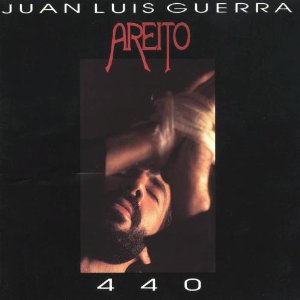
Areíto is the sixth album by Juan Luis Guerra with his band 440, released on 8 December 1992, by Karem Records. The album, meant to be a tribute to the indigenous tribes of the Dominican Republic, is named after a dance that the aboriginal inhabitants of the Greater Antilles (Taínos) accompanied with songs during their festivals and religious rites. The album contains twelve tracks including "Cuando te Beso", interpret by Santo Domingo Philharmonic Orchestra. Congolese musician Diblo Dibala played guitar on the song "El Costo de la Vida", which was a Spanish cover of his own soukous song "Kimia Eve", while the last track on the album, "Naboria daca, mayanimacaná", is sung in Arawak, the language of the Taíno people. Areíto was originally set to be released in early April 1992, but was first delayed to the end of October 1992 and was finally released on 8 December 1992.

Grandes Éxitos de Juan Luis Guerra y 440 or simply Grandes Éxitos is a compilation album of Dominican singer-songwriter Juan Luis Guerra, and his band 440 released in July 1995 by Karem Records. It contained Guerra's fifteen biggest hits from 1988 to 1994 on the original version and from the albums Mudanza y Acarreo(1985) to Fogarate! (1994) on the international versions. The compilation receive positive reviews by the critics.
The Dominican singer, songwriter and producer Juan Luis Guerra has released 14 studio albums, two live albums and forty-eight singles. He is one of the best selling Latin artist of all time with more 30 millions of records worldwide. He made his debut with his first studio album Soplando, released in 1984. He later released his second studio album in 1985, Mundanza y Acarreo which was his first national success and marked his first entry at the US Billboard Charts at number seventeen on Billboard Tropical Charts. In 1987, his third studio album Mientras Más Lo Pienso...Tú become his first work to gain international attention in countries such as Venezuela and Puerto Rico. Between this last two albums, it sold over two million copies worldwide.
"La Media Vuelta" is a song written and performed by Mexican singer José Alfredo Jiménez released in 1963. One of Jiménez' most famous compositions, the song has become part of the traditional Mexican musical repertoire, and has been recorded by dozens of singers and groups.

"Burbujas de Amor" is a song by Dominican singer-songwriter Juan Luis Guerra, released as the third single of his album Bachata Rosa (1990). It is widely considered one of Guerra's most popular songs. The song was a commercial success and became an international hit in Europe and Latin America. It peaked at number 2 on the Hot Latin Songs chart. The track received universal acclaim from critics and was praised for its sophisticated lyrics and elegance.

"Como Abeja Al Panal" is a song by Dominican Republic singer-songwriter Juan Luis Guerra released in 1990 and served as the lead single from his fifth studio album Bachata Rosa (1990). It is a song that tells the story of a forbidden love.
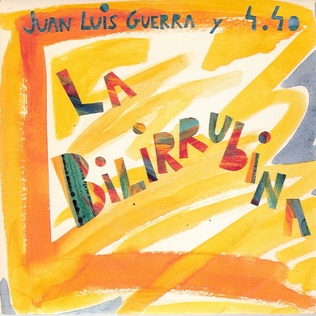
"La Bilirrubina" is a song by Dominican singer-songwriter Juan Luis Guerra. It was written by Guerra and released by Karem Records on 1990 and 1991 in Europe as the second single from his fifth studio album, Bachata Rosa. It was nominated for Record of the Year at 1991 Lo Nuestro Awards. The merengue track is considered one of Guerra's signature songs and most popular. It receive positive reviews and was listed one of the best tracks of the album.
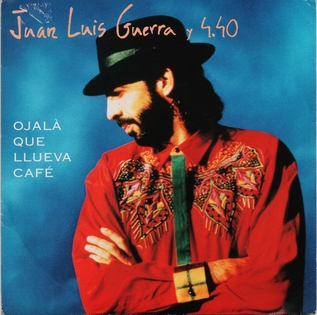
Ojala Que Llueva Cafe is the lead single by the Dominican artist Juan Luis Guerra and his band 4:40 from their fourth studio album of the same title. It was released on 1989 by Karem Records and 1990 in Europe by Ariola Records. The lyrics are a poetic metaphor about the poor conditions of the hard-working people residing in the countryside and the hope that the things are going be better someday in the future. Is one of Guerra’s signature songs and one of the first tracks to gain international attention in his career, peaking on the Billboard Hot Latin Tracks and Latin America airplay charts. The music video was ranked number one of the top 15 best music videos of all time by Dominican artists.
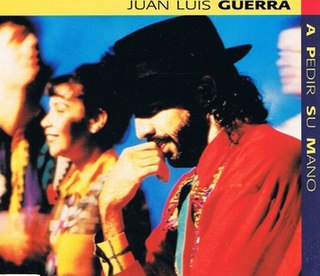
A Pedir Su Mano is a song by Dominican Republic singer-songwriter Juan Luis Guerra released as the fourth single for his album Bachata Rosa (1990). It was released in 1990 by Karem Records and in 1992 on Europe by Ariola. The track is a merengue version of the song “Dede Priscilla,” by Lea Lignazi from the Central African Republic. The track combined music elements of Afropop and zouk with merengue. The music video shows people in traditional African dress dancing in sugarcane fields with a cartoon of a red train traversing the landscape.
Estrellitas y Duendes is a song by Dominican Republic singer-songwriter Juan Luis Guerra released as the fifth single for his album Bachata Rosa (1990). It was released in 1991 by Karem Records. The track is a Bachata with elements of Bolero. It reached the top-ten on the US Billboard Hot Latin Songs and his native Dominican Republic. A live version of the track was later included on Coleccion Romantica (2001).
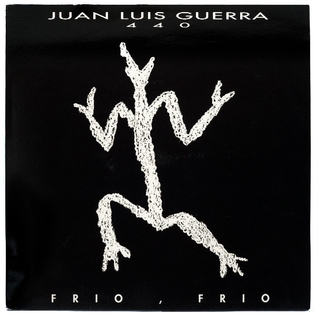
Frio Frio or Frio, Frio is the lead single of the sixth studio album Areito by Dominican superstar Juan Luis Guerra. The track is a bachata and was wrote based on a poem by Federico García Lorca and was released in August 1991. The track was receive positive reviews by the critics and was nominated for Tropical Salsa Song of the Year at the 4th Lo Nuestro Awards. Frio Frio was a success peaking at number 4 on Billboard Hot Latin Tracks and at the Top 5 airplay in Panama and Uruguay.

Señales de Humo is the second single of Juan Luis Guerra sixth studio album Areito (1992). The track is divided in two parts: The first part is a bachata and the second one the rhythm transformed to Mambo with elements of son and salsa. The title made reference of the communication that the indigenous use between vast and unpopulated areas and that are made by bonfires. The song met with critical acclaim and won Song of The Year at the 1994`s BMI Latin Awards. The track was a great success in Latin America and Billboard US Latin charts. The track was included on Guerra`s compilation album Colección Romantica (2001).
Cuando Te Beso(English: When I kiss you) is the seventh and final single of Juan Luis Guerra sixth studio album Areito, released on 1993 in Europe and in January 1994 in the United States by Karem Records. The album also contained other version of the track performed by the Santo Domingo Philharmonic Orchestra. The song peaked at number 28 on the US Hot Latin Songs and reached the top-ten in Chile and Panama. The track receive positive reviews by the critics. Ramiro Burr from Austin American Statesman stated that track is "an affecting tale of devotion". Robert Hilburn from Los Angeles Times wrote that the track had percussion "had some wonderfully affecting ballad work".
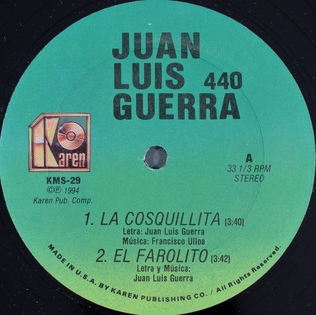
La Cosquillita is the lead single of the seventh studio album Fogarate! by dominican superstar Juan Luis Guerra. It was released on June 21, 1994 by Karen Records. The rural merengue track was written and produced with the Dominican accordionist Francisco Ulloa and his band. About the success of the track, Guerra stated "With the `perico ripiao' we are doing the same thing that we did with the `bachata,' breaking down the barriers that prevent it from reaching all of Dominican society, and then exporting it". The song became Guerra's first number-one hit in his native Dominican Republic; and became a top-ten hit in Spain, Venezuela and the US Hot Latin Songs chart.
"Rosalía" is a song recorded by Dominican singer Juan Luis Guerra for his seventh studio album, Bachata Rosa(1990), included as its first and opening track. It was composed and produced by Juan Luis Guerra and his band 4.40. The track is an upbeat merengue about a lover named Rosalia.The track contains poetic metaphors and lyrics describing that he loves her.Following the success of Bachata Rosa, the track charted inside of Panama Airplay.Eventually, the track was included on the live album Entre Mar y Palmeras (2021) and served as the opening track on the setlist of the tour of the same name.








